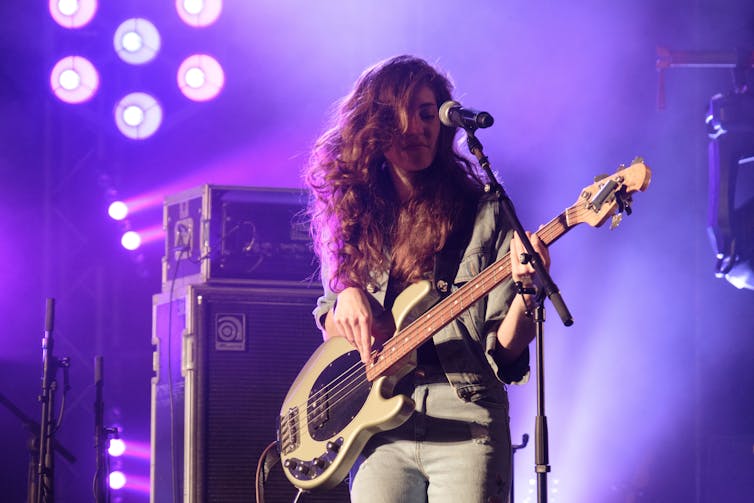A new survey of 126 women and non-binary punters and artists working the music industry in Melbourne has found 60% of respondents feel unsafe in music spaces.
The survey found sexual violence disempowers female music workers, deters non-binary communities from working in the industry, and discourages punters from going to gigs.
This is a marked increase on previous surveys. In the 2018 Victorian Live Music census, only 8% of respondents did not believe “most Victorian venues provide a safe and inclusive environment”.
The 2022 census didn’t even ask about safety or sexual violence.
As Melbourne beats Sydney to became the nation’s most populated city in 2023, the epidemic of sexual violence may intensify in its urban music spaces.
Read more: Is sexual abuse and exploitation rife in the music industry?
The #meNoMore awakening
In 2017, an open letter was signed by over 1,000 women who work or participate in the Australian music industry, calling out abuse and harassment in the industry under the hashtag #MeNoMore.
This is a global problem. Studies have found grassroots venues and promoters in the United Kingdom need to implement changes to tackle sexual violence and work towards gender equality. Music festivals are rife with structural sexism, inequalities and gendered power dynamics.
In music education women “face disadvantages in terms of income, inclusion and professional opportunities”.
In music media, women deal with discrimination, harassment and sexist abuse.

In late 2022, the Raising Their Voices industry report about the contemporary Australian music scene found unacceptably high rates of sexual harassment, sexual harm, bullying and systemic discrimination.
The report called for an industry-wide approach to respond to the findings.
In January, it was announced the federal government’s new Revive cultural policy would establish a centre to address sexual harassment in the arts and entertainment industry.
A frequent violence
In our survey, we found groping and harassment were normalised in clubs and venues.
Respondents reported street harassment to and from venues, or were assaulted in commercially shared vehicles.
The majority of perpetrators were men.
One third of the music punters reported an incident to venue staff or festival management.
“In the last incident of assault I reacted by punching the guy, and I was thrown out by security after I explained what happened […] ” one punter said. “I want to call it out now […] I am sick of this shit”.
Music workers were less likely to report these incidents than punters: 80% of music workers told us they had not reported these incidents to venue staff, festival authorities, music management or to police.
Fearing unemployment in a highly competitive industry, they remain stoic victim-survivors in the boy’s club.

“As someone who has worked in the music industry for 40 years, I feel I have a thicker skin when it comes to sexual harassment… [but] I feel that it really is time for change,” one music worker told us.
What’s next
More than one-third of the music workers we spoke to had considered leaving the industry due to sexual harassment. Some punters told us they were reluctant to go to gigs.
If Melbourne wants to be considered a global music city, then the music talent and audience drain related to the epidemic of sexual violence requires critical attention.
The 2018 Melbourne Music Census found only 49% of staff in venues were trained in-house to deal with sexual harassment or assault.
Our study suggests all security staff should be provided with bystander training to prevent, detect and address perpetrators’ behaviour, and to refer victim-survivors to relevant authorities. Too often, security staff have a reluctance to change routine practices, and many venues have a lack of female security staff. There is poor collaboration between security companies and music staff, and limited funding for grassroots venues to conduct this training.
Less than 10% of the women and non-binary people we spoke to had reached out for counselling support following an experience of sexual violence. More needs to be done to spread the awareness of phone counselling hotlines, such as The Support Act Wellbeing Helpline for people working in music or the arts.
There are international models we can look towards. The not-for-profit Good Night Out began in Leeds, UK, in 2014. The organisation runs accredited sexual violence response training programs for licensed venues and live music events. Its workers put up campaign posters in venues and encourage trained staff to wear badges to alert people that help is available. The program was established in Melbourne in 2021, and an evaluation of the program will be conducted in August this year.
Our report also suggested music venues and organisations should be achieving gender and ethnic diversity among their leadership and staff to be eligible for government funding.
Changes also need to happen beyond the music industry.
Changes in the school curriculum and how we talk about consent more broadly in society will also impact on music spaces. Movements like Teach Us Consent advocate for sex education in schools to include an understanding sexual violence is an unacceptable behaviour, and what it means to have consent.
A 2022 bill in the Victorian parliament adopted an affirmative consent model to provide better protections for victim-survivors of sexual offences, shifting the scrutiny onto their perpetrators.
This bill will help break the code of silence and encourage women and non-binary people to speak out about their experiences of sexual violence.
If this article has raised issues for you, or if you’re concerned about someone you know, call 1800RESPECT on 1800 737 732. In immediate danger, call 000.
Read more: Camp Cope leaves the Australian music industry forever changed by their fearless feminist activism

